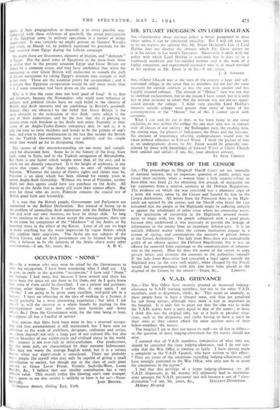THE POWERS OF THE CENSOR SIR, —The proceedings in Dingwall Sheriff
Court are not normally of national interest, but an important question of public policy was raised there recently, when a woman from a little country-village in Ross-shire was fined Li for obtaining five pounds of margarine for her customers from a relative, contrary to the Defence Regulations. The evidence on which she was convicted was a photostat copy of a letter she wrote, taken by the Censor and handed by him to the Crown Authorities. All letters from the Protected Area in the High- lands are opened by the censor, and the Sheriff who heard the case remarked that the people in the Highlands might be suffering unfairly as against the inhabitants of other areas where no censorship exists.
The institution of censorship in the Highlands aroused resent- ment to begin with, but the people submitted with a good grace, because they understood it was necessary to prevent the leakage of information to the enemy from an important defence-area. It is an entirely different matter when the censors themselves engage in a system of spying, and communicate the contents of private letters to the Crown Authorities. The lady from Ross-shire was undoubtedly guilty of an offence against the Defence Regulations, but it was an offence far removed from espionage or the communication of informa- tion to the enemy. How far does the power of the censor to copy private letters and tro'nsmit the contents to the authorities extend? If the lady from Ross-shire had consulted a legal agent outside the Highland area (as she very well might), when charged by the Fiscal, would her correspondence with him also have been placed at the
disposal of the Crown by the censor?—Yours, &c., LIBERTY.






























 Previous page
Previous page